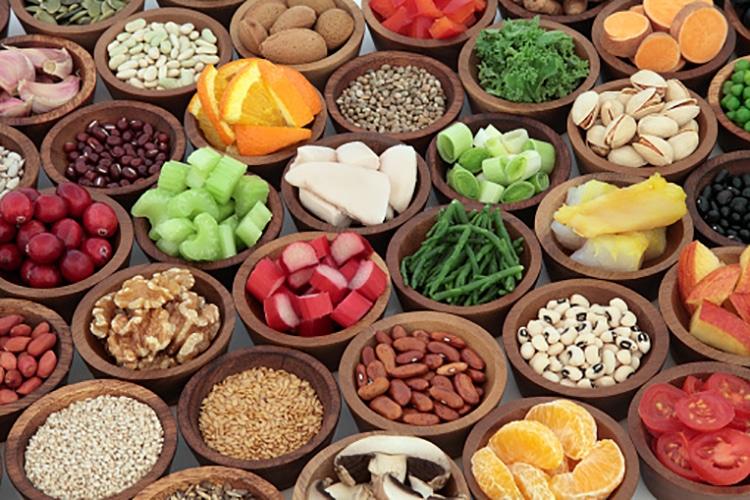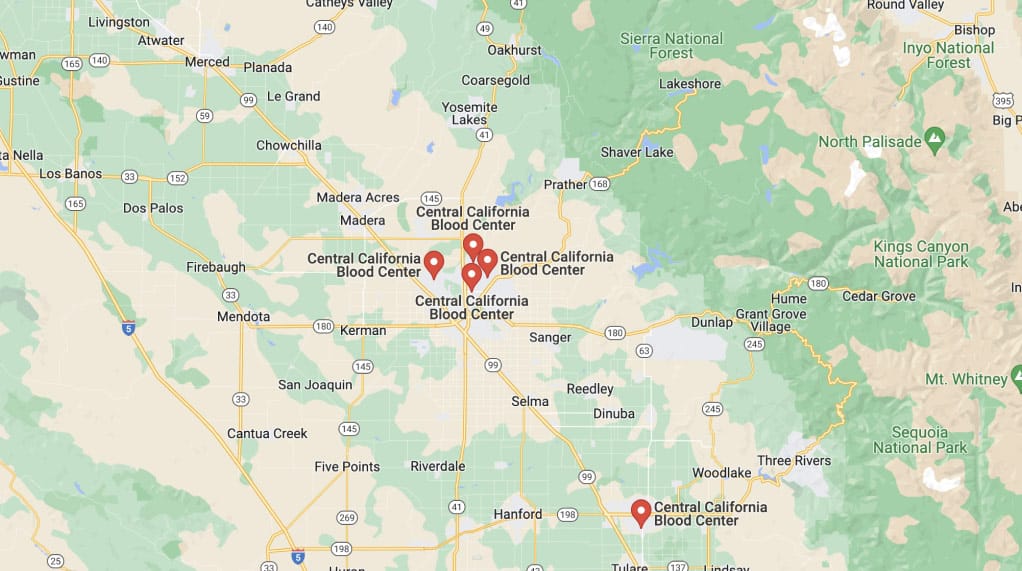
Click here for an important message about maintaining your good health from our Medical Director, Patrick Sadler, M.D.
In order to give blood, we must first determine if it’s safe for you. During the screening process, we take a small sample of blood from a finger stick. The sample is then placed into a special reader to determine if your hemoglobin level is high enough to give blood. If that level is lower than what is acceptable, you will need to increase the amount of iron enriched foods you eat prior to your next appointment. This is also a good idea, if you know you have a history of low iron levels.
INCREASE IRON INTAKE THROUGH FOODS:
- All types of red meat, fish and poultry are excellent dietary sources of iron, since iron from these sources is most easily absorbed by your body.
- Many vegetables, fruits, nuts, beans and grains are also good dietary sources of iron, but iron from plant sources such as these are not absorbed efficiently by your body. Vitamin C enhances iron absorption from such plant sources, so eating vitamin C containing foods (grapefruit, oranges, tomatoes, broccoli and strawberries) in combination with iron-rich vegetables, fruits, nuts, etc. is recommended.
WHAT TO AVOID:
- Caffeinated beverages (coffee, tea, soda, energy drinks), when taken with meals can act as iron blockers, as well as excess consumption of high fiber foods or bran supplements.
Iron Nutrition is important for normal body function and general health.
The Recommended Dietary Allowance (RDA) for pre-menopausal women is 15 mg. per day.
The RDA for men and post-menopausal women is 10 mg. per day.
Iron content of specific foods is given in the attached table.
IRON RICH FOODS
Minimum Daily Requirements:
Men (age 19 to 50+)…10mg. /day
Women (age 15 to 50)… 15mg. /day
Meats
| Chuck stew 4 oz | 3.1 mg |
| Hamburger 4 oz | 3.5 mg |
| Liver 3 1/2 oz | 6.6 mg |
| Roast 8 oz | 4.6 mg |
Chicken
| Fried 1/2 bird | 1.8 mg |
| Breast (fried) | 1.1 mg |
| Roasted 3 1/2 oz | 2.1 mg |
| Livers 2 large | 7.4 mg |
Turkey
| Roasted 3 slices | 5.1 mg |
Fish
| Tuna in oil 3 1/2 oz | 1.9 mg |
| Tuna in water 3 1/2 oz | 1.6 mg |
| Scallops 3 1/2 oz | 1.6 mg |
| Shrimp 1/2 lb | 2.5 mg |
| Clams (hard) 5 to 10 | 7.5 mg |
| Clams (soft) 4 to 9 | 3.4 mg |
| Oysters 5 to 8 | 5.5 mg |
Veal
| Cutlet 4 oz | 3.3 mg |
| Stew meat 3 1/2 oz | 3.5 mg |
Lamb
| Leg 4 oz | 2.3 mg |
| Loin Chop 4 oz | 2.3 mg |
Pork
| Loin 4 oz | 2.3 mg |
| Spareribs 8 oz | 2.9 mg |
| Ham: (baked)2 1/2 oz | 2.1 mg |
| Canned 4 oz | 3.0 mg |
| Luncheon Meats | |
| Liverwurst 1 slice | 1.6 mg |
| Salami 1 slice | 1.0 mg |
Eggs
| 1 Large whole | 1.2 mg |
Beans
| Dry: Lima 1.2 cup | 2.9 mg |
| Navy 1.2 cup | 2.5 mg |
| Kidney 1/2 cup | 2.2 mg |
| Fresh: Lima 1/2 cup | 2.1 mg |
| Sprouted mung 1 cup | 4 mg |
| Cereals (hot/cold) | Up to 15 mg |
Breads & Grains
| Bagel 3″ | 1.2 mg |
| Bran flakes 40% 1 cup | 12.3 mg |
| with raisins 1 cup | 17.7 mg |
| Breadcrumbs dry 1 cup | 3.6 mg |
| Gingerbread 1 slice | 1.0 mg |
| Macaroni 1 cup | 1.4 mg |
| Egg noodles 1 cup | 1.4mg |
| Oatmeal 1 cup | 1.7 mg |
| Rolls: Hard 1 med | 1.3 mg |
| Hot dogs and hamburgers | 1.2 mg |
| Cream of Wheat 1 serving | 25.0 mg |
Vegetables
| Artichoke 1 whole | 1.4 mg |
| Jerusalem 1 medium | 3.4 mg |
| Asparagus 6 stalks | 1.3 mg |
| Brussel sprouts 6 to 7 | 1.1 mg |
| Chard 1/2 cup (cooked) | 1.3 mg |
| Chestnuts 10 | 1.2 mg |
| Dandelion greens (cooked) 1/2 cup | 1.8 mg |
| Endive 1 cup | 1.0 mg |
| Lettuce (Boston) 1 cup | 1.1 mg |
| Mustard greens (cooked) | 1.8 mg |
| Black-eyed peas (cooked) 1/2 cup | 1.7 mg |
| Green peas (cooked) 1/2 cup | 1.4 mg |
| Potato (baked) 1 medium | 1.1 mg |
| Spinach (raw) 1 cup | 1.7 mg |
| (cooked) 1/2 cup | 2.0 mg |
| Sweet Potato (baked) | 1.0 mg |
| Tomato: Fresh, med | 0.9 mg |
| juice 1 cup | 2.2 mg |
Fruits
| Apple Juice 1cup | 1.5 mg |
| Apricots: (dried uncooked) 1/2 cup | 3.6mg |
| (dried cooked) 1.2 cup | 2.3 mg |
| Avocado 112 | 1.3 mg |
| Banana (mashed) 1 cup | 1.6 mg |
| Cantaloupe 1/2 mad | 1.6 mg |
| Dates (pitted) 10 | 2.4 mg |
| Dates (cut-up )1/2 cup | 2.6 mg |
| Orange juice (canned) 1cup | 1.0 mg |
| Prunes: (canned) 1/2 cup | 1.1 mg |
| (dried uncooked) 10 | 3.3 mg |
| juice 1 cup | 2.5 mg |
| Raisins 1/2 cup | 2.9 mg |
| Strawberries 1/2 cup (frozen) | 1.0 mg |
| Watermelon 8″ X 4″ wedge | 2.0 mg |
Nuts
| Shelled: Almonds 1/4 cup | 1.7 mg |
| Cashews 1/4 cup | 1.2 mg |
| Walnuts 1/4 cup | 1.9 mg |




